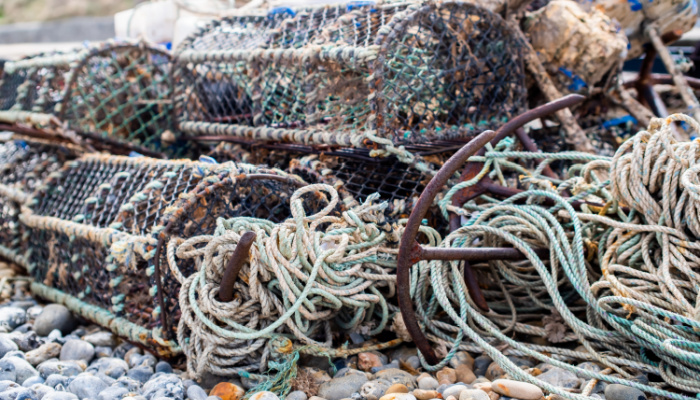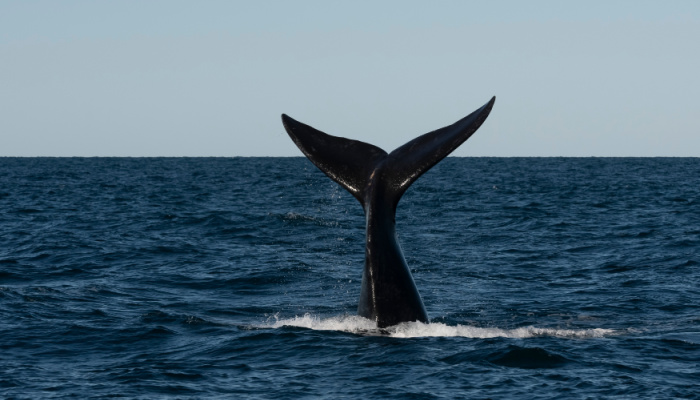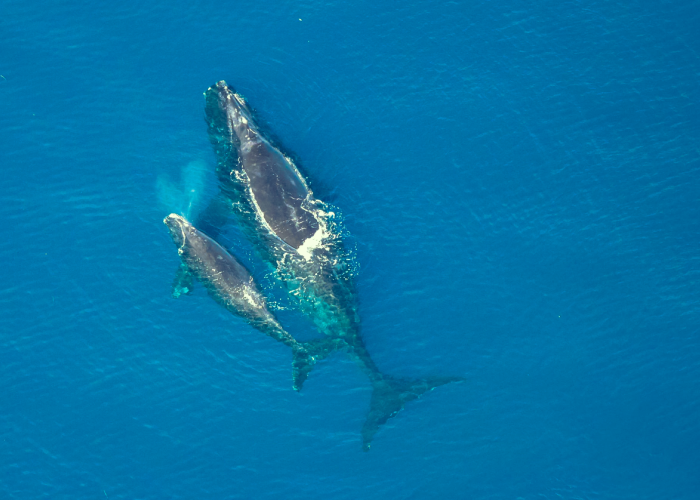What if the opportunity to protect your young — from pregnancy to birth and beyond — was out of your hands (or flippers)? For the few expectant North Atlantic right whales who become mothers each year, this is their unfortunate reality.
Coming to Term(s)
Approximately 340 individuals remain in the North Atlantic right whale population, but the number of reproductive females is far less. It’s estimated only about 70 of these individuals have the capacity to carry the next generation, if their body condition is even strong enough to sustain a pregnancy and carry to term.
As humans, we prep our bodies to carry a child and take precautions during pregnancy to remain healthy. However, many right whales start their motherhood journey with sustained trauma and injury from human-induced threats, like vessel collisions and fishing gear entanglement. Studies show these life-altering situations cause heightened levels of stress, lasting injuries and stunted growth for themselves as well as their future young.
In this critical gestation period where expectant mothers aim to nourish their body to benefit their unborn offspring, these whales already have the odds stacked against them.
Delivering Into Uncertainty
While we contemplate our many desires for labor and delivery in the months leading up to it, our whale counterparts have one main directive in mind: Make it to the calving grounds in time.
South Carolina’s offshore environment is part of the calving grounds for North Atlantic right whales. At some point long ago, conditions aligned and our waters became safe harbor for these whales to bring life into the world. Now every year from November–April, we welcome the whales’ return, cheering them on from our coastal sidelines as scientists take to the skies searching for these new mother-calf pairs.
 Scientists perform aerial surveys over the open ocean to search for mother-calf pairs.
Scientists perform aerial surveys over the open ocean to search for mother-calf pairs.Each birth announcement feels like a victory bringing this species one step closer to stability. This season, we’ve already welcomed 17 new right whales into the world. Yet, we wait with bated breath for waves of injury and fatality reports to follow, as these calving grounds aren’t as safe as they once were.
A Perilous Playground
The ocean serves as a source of sustenance, respite, play, learning and protection for these new mothers to nurture their calves. However, the ocean is hardly free of hazards; these mother-calf pairs face perilous conditions in their underwater playground. They tend to stay close to the ocean’s surface, leaving them dangerously vulnerable to lethal interactions with vessels, like blunt force trauma and propeller strikes.
And while threats loom above the waves, others lurk below.
Studies show that more than 83% of right whales have been entangled in fishing gear at least once in their lifetime. The physical injuries caused by entanglement alone can significantly alter any whale’s life expectancy.
 Entanglement in fishing gear is a major threat for right whales.
Entanglement in fishing gear is a major threat for right whales.The cost if a new mother succumbs to her injuries is far more disheartening; her calf is left without a critical caretaker during their formative years. And losing a reproductive female from a population already on the verge of extinction removes their opportunity to carry future offspring as well.
It Takes a Village
With each trial and tribulation North Atlantic right whales face, we can draw parallels to our own journeys in parenthood. Like them, we strive to lead the next generation through life’s many obstacles, teaching them along the way so they can thrive on their own someday.
And if we’re lucky, others help, too. As the saying goes: It takes a village to raise a child… or in this case, a calf. We have the power to support this species and ensure our own children and grandchildren live in a world where right whales still exist beyond the shore.
 Together, we can help right whales.
Together, we can help right whales.- Soak up all the knowledge you can. New data, studies, legislation, articles and more are always emerging. Staying informed helps to understand the next step needed.
- Seek out others who want the same solution. A collective of advocates with aligned views can be the strongest catalyst for change.
- Don’t be scared to start conversations. Your perspective could help others connect to this cause and foster a culture of caring for the future.
- Slow down when you’re on the water. Out of sight shouldn’t mean out of mind. The ocean is their home, and right whales need our respect.
- If you spot a whale, share that information! The National Oceanic and Atmospheric Administration is asking that all right whale sightings in South Carolina are reported to (877) 942-5343. Right whale sightings in any location may also be reported to the U.S. Coast Guard via channel 16 or through the Whale Alert app.
Stay informed on conservation issues that are important to you by subscribing to our emails.
Published February 8, 2024


